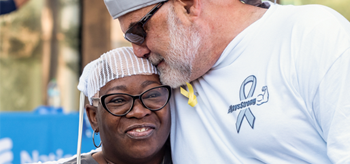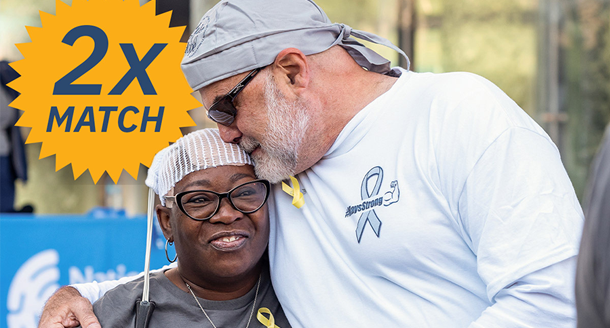Major Pediatric Cancer Foundation to Invest in the Defeat Pediatric Brain Tumors Research Collaborative
BOSTON, MA & MONROVIA, CA – National Brain Tumor Society (NBTS), the largest nonprofit organization in the United States dedicated to the global brain tumor community, announced that the St. Baldrick’s Foundation, the largest private funder of childhood cancer research grants, has committed to supporting NBTS’ flagship pediatric research program: the Defeat Pediatric Brain Tumors Research Collaborative.
“St. Baldrick’s Foundation is a leader in the pediatric cancer advocacy and philanthropic community,” said David F. Arons, Chief Executive Officer, National Brain Tumor Society. “St. Baldrick’s has shown a commitment over the years to funding important pediatric brain tumor research projects, and we have also had the pleasure of collaborating on a number of public policy advocacy efforts. We are thrilled that we will now officially partner to change the trajectory of pediatric brain tumors, and hope others will join us in this quest.”
This year, more than 4,600 children and adolescents (0-19 years) will be diagnosed with a pediatric brain tumor, making these tumors the most prevalent form of pediatric cancer. The research program is based on NBTS’ “Defeat” program model, which is a new business approach to science that facilitates collaboration and exchanges of real-time data to accelerate progress in advancing research to treatments and transforming the way brain tumor research is funded and conducted.
“Brain tumors are the deadliest form of childhood cancer, recently having surpassed leukemia, and sadly there has been little change to survival rates in children with pediatric high-grade glioma in four decades,” said Kathleen Ruddy, CEO of the St. Baldrick’s Foundation. “More research is needed which is why St. Baldrick’s is pleased to support the Defeat Pediatric Brain Tumors Research Collaborative, led by the National Brain Tumor Society. We believe this program has the potential to accelerate scientific discovery in the field of pediatric brain tumors, and equally important, will at long last, offer hope to countless families whose children’s futures need it most.”
The Defeat Pediatric Brain Tumors Research Collaborative seeks to transform the course of the pediatric brain tumor landscape by:
- Developing the first-ever standard of care for treating pediatric high-grade gliomas – including diffuse intrinsic pontine gliomas (DIPG) – in order to extend and improve the lives of these patients.
- Designing new and trusted preclinical models for testing that incentivize the pharmaceutical industry to provide compounds and agents to researchers, as well as launch more pediatric high-grade glioma trials.
- Developing a platform that creates a system of tested and validated compounds to feed phase I clinical trials.
- Building a collaborative research model that will allow researchers to share their findings and apply it in the fight against all pediatric brain tumors.
Learn more about the Defeat Pediatric Brain Tumors Research Collaborative here.
About Pediatric Brain Tumors
This year, more than 4,600 children and adolescents (0-19 years) will be diagnosed with a pediatric brain and central nervous system (CNS) tumor, making these tumors the most prevalent form of pediatric cancer. Unfortunately, these tumors are also the deadliest form of cancer in all of pediatrics, accounting for three out of every 10 cancer deaths in children and adolescents under the age of 19. Despite these facts, there has never been a drug developed specifically to treat pediatric brain tumors. In fact, there are very few standards of care or treatment options for children with brain tumors. In particular, pediatric high-grade gliomas have no standard of care. Overall, only 15-30% of all children with high-grade gliomas survive more than five years. For DIPG, the diagnosis is “uniformly fatal,” and most children only survive nine months, or about as long as the typical school year. Further, because no treatment has been developed specifically with a child’s developing brain in mind, the treatments that are currently used (mainly radiation and chemotherapies) often inflict a lifetime of neurological, cognitive, developmental, and other deficits on the children who do manage to survive their tumor.
About St. Baldrick’s Foundation
As the largest private funder of childhood cancer research grants, the St. Baldrick’s Foundation believes that kids are special and deserve to be treated that way. St. Baldrick’s funds are granted to some of the most brilliant childhood cancer research experts who are working to find cures and better treatments for all childhood cancers. Kids need treatments as unique as they are – and that starts with funding research just for them. Join us at StBaldricks.org to help support the best cancer treatments for kids.
About National Brain Tumor Society
National Brain Tumor Society (NBTS) is the largest nonprofit organization in the U.S. dedicated to the brain tumor community. We are fiercely committed to finding better treatments and driving rapid progress toward a cure for brain tumors. We drive a multi-faceted and thoughtful approach to aggressively influence and fund strategic research, as well as advocate for public policy changes, in order to achieve the greatest impact, results, and progress for brain tumor patients. Money raised by the generous donations of our supporters has directly funded groundbreaking discoveries, programs, clinical trials and policy initiatives. To learn more visit www.braintumor.org
Media Contacts:
Tom Halkin, National Brain Tumor Society, thalkin@braintumor.org, 617-393-2849
Michael Antonellis, National Brain Tumor Society, mantonellis@braintumor.org, 617-393-2841
Traci Shirk, St. Baldrick’s Foundation, traci@stbaldricks.org, 626.792.8247 ext. 250
# # #




